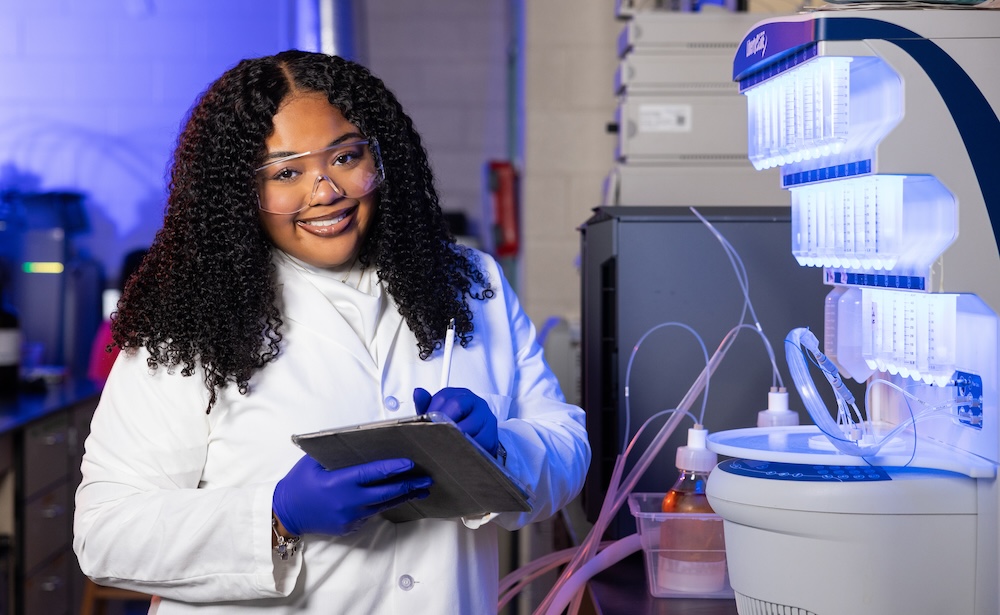

KENNESAW, Ga. | Oct 17, 2024

After launching her student research career in an organic chemistry lab, she has shifted her focus to a biochemistry lab where she works with protein blockers that can help patients with dementia-related brain maladies, a major change in the final year of graduate study.
“It's very thrilling, especially trying to learn a whole new discipline in such a short time span,” she said. “It's teaching me a lot, and I'm very excited to conduct important research that will help people.”
Gordon is no stranger to the Department of Chemistry and Biochemistry in the College of Science and Mathematics, having earned her bachelor’s degree in chemistry in Fall 2022. She’s now on track to earn her Master of Science in Chemical Studies in Spring 2025. What’s more, she has shifted gears in moving from one research group in undergraduate studies to another to finish her master’s degree, showing adaptability to a new research project.
Science has driven Gordon to great heights since her high school days at Arabia Mountain Engineering Academy in Decatur. She took an AP chemistry class that sparked her interest in that subject, which she mastered to a point that she could tutor her classmates, though a biology project inspired her interest in research.
With chemistry the focus for her undergraduate days, Gordon enrolled at Kennesaw State thinking she’d go to medical school and eventually become a dermatologist. A couple of years of undergraduate research changed her course. She conducted research alongside assistant professor Carl Saint-Louis, who persuaded her to continue her work in the lab in graduate school.
“He suggested that a master’s degree could make me more competitive when applying for doctoral degrees,” she said. “I knew I had a home in his lab.”
Supported by a National Science Foundation grant, she co-authored a paper, presented data at the American Chemical Society conference, and mentored undergraduate students, all in her first year of graduate studies.
There was one more transition to come, however.
Gordon decided to switch labs to give herself an even broader base of knowledge, and she moved to the lab of assistant professor Mohammad Halim, where she now researches inhibitors of amyloid beta-42, the peptide responsible for symptoms of Alzheimer’s disease. Halim said Gordon has handled the switch well and stands as proof of the efficacy of undergraduate research leading students to advanced degrees.
“She has very good knowledge and training in organic synthesis from her undergraduate research with Dr. Saint-Louis’ lab,” he said. “Lyric is very passionate about her research project. She is respectful, caring, and colloborative when she works with undergraduate students in my lab.”
Gordon said the prospects of impacting research in a common and tragic disease has sparked a new interest. She has shifted the focus of her thesis in this direction as well, even if the late switch added some stress to the equation.
“It’s a process, but I’m getting it done—hopefully wrapping things up on time in the spring,” she said. “KSU has been a good place for me at every stage.”
— Story by Dave Shelles
Photos by Matt Yung
A leader in innovative teaching and learning, Kennesaw State University offers undergraduate, graduate, and doctoral degrees to its more than 51,000 students. Kennesaw State is a member of the University System of Georgia with 11 academic colleges. The university's vibrant campus culture, diverse population, strong global ties, and entrepreneurial spirit draw students from throughout the country and the world. Kennesaw State is a Carnegie-designated doctoral research institution (R2), placing it among an elite group of only 8 percent of U.S. colleges and universities with an R1 or R2 status. For more information, visit kennesaw.edu.